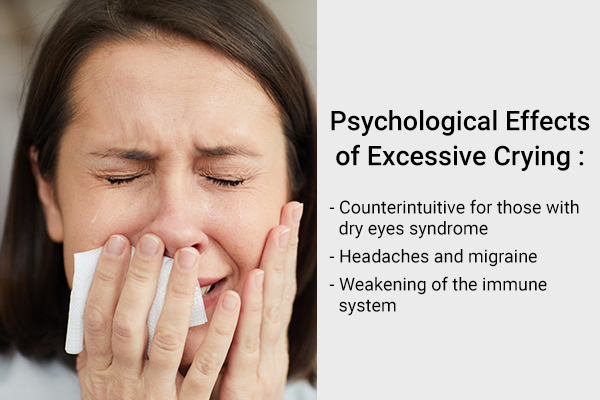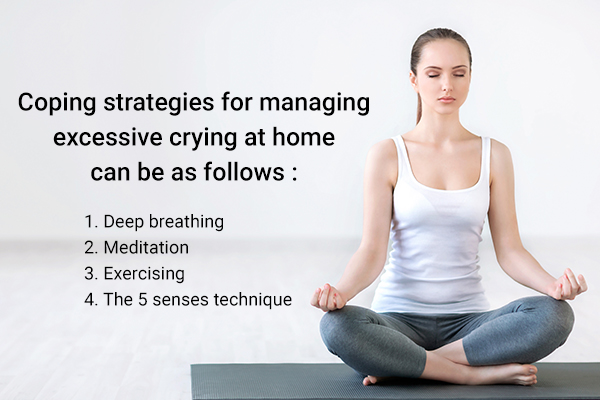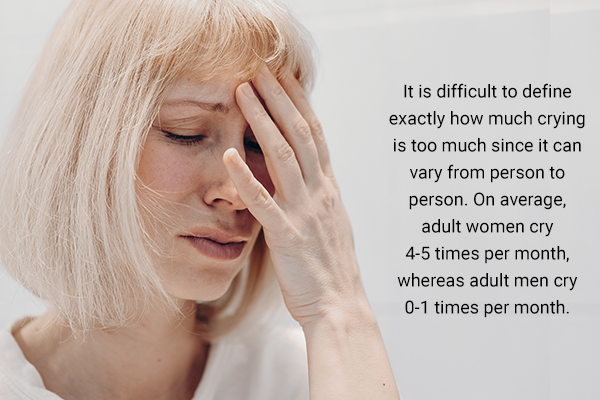In this article:
Crying is a natural physiological response to various emotional states including sadness, grief, anger, frustration, and joy. While most people cry occasionally, some individuals tend to cry more frequently and intensely than others. (1)

The act of crying is typically associated with emotional relief and catharsis. However, there is a common belief that excessive crying can lead to physical illness, even mental problems.
This article will discuss whether crying too much can make you sick and will examine the negative effects of crying on physical and mental health.
Effects of Excessive Crying on Health
Crying too much can have some ill effects on both the mental and physical aspects of health.
1. Crying too much may impact your mental health
No doubt crying can be beneficial for your mental health by helping release emotions and providing a sense of relief and comfort. It can be a way to self-soothe and cope with difficult situations. (1)(2)
However, excessive crying can be a sign of mental health problems such as depression and anxiety. (1)(2) Some mental health issues that may arise from crying excessively are as follows:
a. Tiredness and irritability
Crying is an intense activity, and crying for a long period can be exhausting and draining for the body. This may lead to fatigue, tiredness, or lethargy. (2)
Additionally, excessive crying can also be emotionally draining, sometimes putting you in a worse mode that may include feelings of irritability, frustration, or even anger. (3) However, these may also be a consequence of depression.
b. Feeling lonely and isolated
According to a study, having someone a crier trusts, such as a close friend or family member, present during a crying episode was more likely to result in an improvement in the crier’s mood.
However, if there were more than one person present, the crier was more likely to experience negative effects on their mood such as feeling lonely or isolated. (4)
Therefore, experts suggest having only a few close and supportive people around you when you feel like crying to comfort and console you, which can improve your mood. (2)(5)(6)
c. Makes you feel worse and not in control
When you cry, you think about the reasons behind it, which can affect your mood.
Also, crying because you see someone else suffering can make you feel down as well. This might be because you feel like you can’t do anything to help them and it’s out of your control. (2)
If your crying is caused by unresolved issues, you may not always feel better afterward. So, crying a lot, especially when you feel like a situation is not in your control, can have a negative impact on your mental health. (2)(6)
2. Excessive crying also affects physical health

While the psychological effects of excessive crying are well documented, less is known about the physical effects, which are as follows.
a. Weakening of the immune system
Crying is a normal emotional response, but some people believe that crying too much can weaken your immune system and increases the likelihood of you getting sick.
While there isn’t a lot of scientific evidence to fully confirm this idea, a study on 39 women found an interesting connection between crying and immunity.
The study found that watching funny videos and laughing had a positive effect on the immune system, and crying had the opposite effect. It was found that crying suppressed the immune system and led to reduced levels of a substance called immunoglobulin A (IgA), which is important for immune function. (7)
b. Counterintuitive for those with dry eyes syndrome
Excessive crying can have unexpected effects, especially for those with dry eyes syndrome. Dry eyes syndrome is a condition where the eyes don’t create enough tears, resulting in distress and irritation.
You might think that dry eyes would mean fewer tears, but it can lead to episodes of excess tearing. This happens because the dryness in the eyes can cause pain or discomfort, which triggers the body to produce more tears as a response. (8)
c. Headaches and migraine
One of the greatly documented physical signs associated with excessive crying is headaches.
One study found that crying can be a trigger for migraines in some individuals. The study detailed the clinical history of two women with migraines triggered by crying associated with sadness or emotional upset. The authors suggested that crying may be an underrecognized migraine trigger. (9)
Moreover, a prospective evaluation study conducted on 163 workers or students from the Universidade Metropolitana de Santos revealed that 55.2% of the participants considered crying to be a potential factor for triggering headache attacks, both for migraine and tension-type headaches.
This study highlighted the importance of crying as a causal factor for primary headaches. (10)
3. Excessive crying can be bad for your child’s health
A study suggested that excessive crying in infants, defined as crying for 3 or more hours per 24-hour period, is associated with an increased risk of emotional and behavioral problems in children at age 5–6 years. This can include conduct issues, hyperactivity, and mood troubles.
Therefore, excessive crying in infants can have negative consequences on the child’s emotional and behavioral development later in life. (11)
Coping Strategies for Excessive Crying

For individuals who experience excessive crying, it is important to develop coping strategies to manage the emotional and physical effects.
The first step, however, should be to identify underlying mental health issues and to seek appropriate treatment. This may include therapy, medications, or a mix of both after referring to a doctor.
Coping strategies for managing excessive crying at home can be as follows.
1. Deep breathing
Deep breathing is a simple and useful coping mechanism for handling anxiety and stress.
The 5-3-7 breathing technique involves taking a deep breath in for 5 seconds, holding the breath for 3 seconds, and exhaling slowly for 7 seconds. This technique can be practiced anywhere and at any time, and it can quickly bring a sense of calm and relaxation to the body and mind. (12)
2. Meditation
Studies have shown that mindfulness and meditation practices can be beneficial during difficult periods, such as the COVID-19 pandemic.
Mindfulness-based stress reduction (MBSR) is one evidence-based practice that has been found to improve anxiety and depression. Additionally, researchers have recorded positive changes in the brains of people after long-term meditation. (13)
3. Exercising
Aerobic exercises, such as swimming, cycling, walking, dancing, jogging, and gardening, have been shown to effectively reduce symptoms of anxiety and depression, which can in turn reduce the feeling of wanting to cry.
This improvement in mood is believed to be attributed to increased blood flow to the brain and the impact of exercise on the hypothalamic-pituitary-adrenal (HPA) axis, which affects the body’s physiological response to stress.
The HPA axis communicates with various regions of the brain, including the areas responsible for regulating motivation and mood, the amygdala (which generates fear during stressful events), and the hippocampus (which plays a crucial role in memory formation, mood, and motivation). (14)
4. The 5 senses technique
The 5 senses technique is a useful coping strategy for managing difficult emotions, particularly during a crisis. This technique involves taking a moment to focus on what each of your senses is experiencing in the present moment.
By paying attention to your surroundings and sensory experiences, you can ground yourself and stay present in the moment.
To do this, look around and notice what you see, feel what you are touching, listen to the sounds around you, and smell any scents in the air. By focusing on your senses, you can be in the present moment and not pay much attention to the overwhelming thoughts or memories of the past. (12)
How to Know When Crying Starts to Make You Sick?
If crying becomes excessive and frequent, if it starts to interfere with daily activities, or if you are unable to cry despite feeling the need to, it is important to seek medical attention. These symptoms may be signs of clinical depression or other mental health issues that call for proper evaluation and treatment. (15)
How Much Crying Is Too Much Crying?

It is difficult to define exactly how much crying is too much since it can vary from person to person. On average, adult women cry 4–5 times per month, whereas adult men cry 0–1 times per month.
Crying is a normal human response to both positive and negative events in life, but if it happens very often and/or for no clear reason, affects everyday life, or becomes uncontrollable, it may be a sign of a problem.
If you are concerned about your crying frequency, it would be best to speak to a health professional who can evaluate the situation and advise appropriate treatment. (16)
When to See a Doctor
There are several myths and misconceptions about crying and health that persist in popular culture. One of the most common is the belief that crying is a sign of weakness or that it is unhelpful to express emotions.
This belief can lead to shame and stigma around crying and can discourage individuals from seeking emotional support. If you feel like crying all the time or have been crying excessively, you may need professional help.
Most-Asked Questions
Can crying too much lead to depression?
While excessive crying can be a symptom of depression, there is no evidence to suggest that crying itself can cause depression.
Is it normal to cry every day?
Crying every day may indicate underlying mental health issues and should be evaluated by a healthcare professional. According to a study, more than 16% of residents in a nursing home cry daily due to clinical needs and as an expression of stress and unhappiness. (17)
Does crying make you feel better?
Crying can provide emotional relief and promote emotional regulation, leading to improved mental health, if done in moderation. (2)
Final Word
Crying is a natural physiological response to any stimuli. While crying can have positive effects on mental and physical health, excessive crying can indicate underlying mental health issues and can lead to physical and emotional symptoms.
While there is limited scientific evidence to support the notion that crying can cause serious physical illness, it is important to seek appropriate treatment and develop coping strategies for managing excessive crying.
- Was this article helpful?
- YES, THANKS!NOT REALLY


